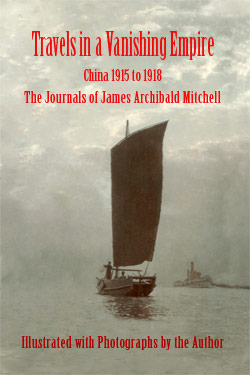
 Buy Buy
"This book is pure gold for both old China hands and readers who just
want a good adventure in a bye-gone world. James Archibald Mitchell's
fresh and lively observations of his travels in warlord China, 1915-18,
are witness to a China closer to the middle ages than the industrial era."
-Gary Moore, playwright and author of Burning in China
Videos about the book by
Komatik Press
Scout Trip to Kunshau
People of the Chinese Countryside
Shops at Zau Ka Doo
Trouble in Shanghai
A Walk Along Soochow Creek
The Paper Hunt
|
Travels in a Vanishing Empire: The Journals of James Archibald Mitchell
Komatic Press,
2017 It was a tumultuous period of Chinese history. In 1912, the 250 year-old Qing dynasty had been overthrown and powerful generals and political leaders were vying for control. Warlords and rebel armies were ranging the countryside; there was no effective central government, and the powerful foreign businessmen and missionaries were walled in well-defended compounds.
In 1915, in the midst of this chaos, a 24 year old college graduate named James A. Mitchell, landed in Shanghai to teach English at St John's College, so-called Harvard of the East. Mitchell was an avid diarist, and also a skilled photographer and observer of local customs, and whenever he had time off he set out to explore the country, the presence of warring armies and travel difficulties notwithstanding. Arch, as he was known, was brought up in Centreville, Maryland, the son of a popular Episcopalian minster, and was educated at Trinity College in Hartford, Connecticut. He was essentially a country boy, a dyed-in-the wool American with no international experience, and the storied Orient was both an inspiration and a shock to him. But as he makes clear in an early journal, he intention with the journals was to record what he sees with an objective, eye --- not an easy task for one so deeply schooled in Christianized Western culture. What emerges over the course of the three years in these journals, is an almost anthropological account of China during the Warlord Period in both words and photographs, a record of peasant life, boat families, climbing expeditions, and above all, exquisite images of the Chinese landscape of the period. |